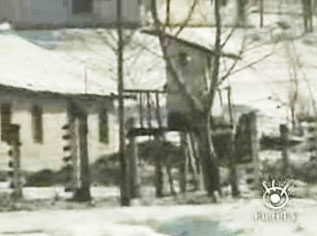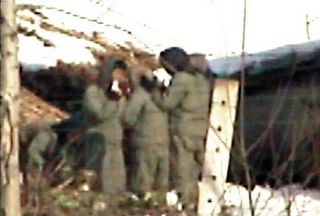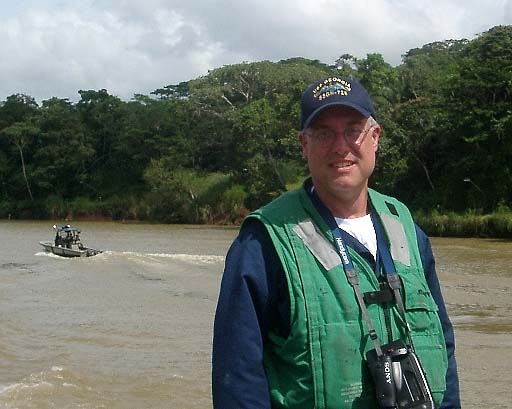Monday, February 28, 2005
Note to Readers - Both of You
I had been using Haloscan's trackback feature only, but decided to use the comments also because they are better. Sadly all of the old comments disappeared when I did that. You have my apologies.
Sunday, February 27, 2005
Modern Liberalism - Politics of Death
Marlowe's Shade writes this about the Business of Death.
This is not liberal. The kind of liberalism that protected people's lives and freedoms (and national security too) has become malignant. The liberalism of the 19th century philosopher and writer John Stuart Mill and more recently, Franklin D. Roosevelt, Harry S. Truman, and John F. Kennedy, is dead.
Modern liberalism does stand against capitol punishment;
The numerous conflicts of interest in the Terri Schiavo case parallel the situation of abortion providers such as Planned Parenthood and NARAL being allowed to "counsel" women on their decision and then being paid for the services. The abortion industry has proved to be very profitable but it isn't really a growth industry due to the "Roe Effect". By aborting more of their children than their opponents, abortion supporters are also decreasing the potential market for abortions in the next generation. Cigarette manufacturers can sympathize.Death is seen as a valid option for unborn children, euthanasia and assisted suicide, [covers the seriously ill, aged, and almost all other people - ed.]
The idea that euthanasia and assisted suicide should only be practiced if a patient has a terminal condition has never been accepted in the Netherlands.(20) Under both the previous guidelines and the new law in the Netherlands, unbearable suffering of either a physical or mental nature has been the factor that qualifies one for induced death.(21)Now with Terri Schiavo we have a case where a soft-headed judge has ordered that her husband kill her because her existence is inconvenient;
It appears that not even the prerequisite of subjective unbearable suffering will be maintained for much longer. Discussion now centers on whether assisted suicide should be available to elderly people who are healthy but "tired of life." Dutch Minister of Justice Els Borst has said, "I am not against it if it can be carefully controlled so that only those people of advanced age who are tired of life can use it."(22)
Assisted suicide for non-terminally ill patients has also been advocated repeatedly in the United States. [emphasis mine, the indicated footnotes are available at the linked site - ed.]
Michael Schiavo said his wife never wanted to be kept alive artifically, but she left no written directive.And kill her by depriving her of food and water. If I did this to my dog I would be put in jail, and rightfully so.
The Schindlers dispute their daughter had such wishes and say their son-in-law stands to gain from his wife's death, both financially and personally. They have offered to take care of her if Michael Schiavo, who has a new family with another woman, would divorce her.
This is not liberal. The kind of liberalism that protected people's lives and freedoms (and national security too) has become malignant. The liberalism of the 19th century philosopher and writer John Stuart Mill and more recently, Franklin D. Roosevelt, Harry S. Truman, and John F. Kennedy, is dead.
Modern liberalism does stand against capitol punishment;
Be it resolved that because social science research has demonstrated the death penalty to be racist in application and social science research has found no consistent evidence of crime deterrence through execution, [not consistantly applied - ed.] the ASC publicly condemns this form of punishment and urges its members to use their professional skills in legislatures and the courts to seek a speedy abolition ofIt seems that, according to this modern, malignant form of liberalism, the only people that shouldn't be killed are murderers.
this form of punishment (ASC Annual Meeting, Montreal, 1987).
Bush Lied (or was it Boxer?)
It would be nice if the people who charge President Bush with lying about Weapons of Mass Destruction (WMD) in Iraq as a justification for war there would actually read the Joint Resolution to Authorize the Use of United States Armed Forces Against Iraq. With all of the charges of "Bush lied, it's all about oil" that continue to poison the political discourse it would seem reasonable to review the actual document.
First of all, it was passed by large bi-partisan majorities in both the House and the Senate. Of course Sen. Boxer (Moonbat, CA) voted against the bill, a fact which she pointed out during Dr. Rice's confirmation hearings. Sen. Boxer said;
Read the Resolution.
First of all, it was passed by large bi-partisan majorities in both the House and the Senate. Of course Sen. Boxer (Moonbat, CA) voted against the bill, a fact which she pointed out during Dr. Rice's confirmation hearings. Sen. Boxer said;
BOXER: Well, you should you read what we voted on when we voted to support the war, which I did not [did not read what they voted on also, perhaps - ed.], but most of my colleagues did. It was WMD, period. [pretty clear assertion - ed.] That was the reason and the causation for that particular vote. But again, I just feel, you quote President Bush when it suits you, but you contradicted him when he said, Yes, Saddam could have a nuclear weapon in less than a year. You go on television, nine months later, and said, Nobody ever said it was going to be.So, what did the Resolution say? Twenty-three reasons are given for going to war with Iraq. Among the reasons are 17 which refer to reasons other than WMD (although in a few WMD is mentioned as one condition among others).
Whereas in 1990 in response to Iraq's war of aggression against and illegal occupation of Kuwait, the United States forged a coalition of nations to liberate Kuwait and its people in order to defend the national security of the United States and enforce United Nations Security Council resolutions relating to Iraq;So enough with "Bush lied - people died". THAT is the lie.
...
Whereas Iraq, in direct and flagrant violation of the cease-fire, attempted to thwart the efforts of weapons inspectors to identify and destroy Iraq's weapons of mass destruction stockpiles and development capabilities, which finally resulted in the withdrawal of inspectors from Iraq on October 31, 1998; [deals with inspections, not the weapons - ed.]
...
Whereas Iraq persists in violating resolutions of the United Nations Security Council by continuing to engage in brutal repression of its civilian population thereby threatening international peace and security in the region, by refusing to release, repatriate, or account for non-Iraqi citizens wrongfully detained by Iraq, including an American serviceman, and by failing to return property wrongfully seized by Iraq from Kuwait;
Whereas the current Iraqi regime has demonstrated its capability and willingness to use weapons of mass destruction against other nations and its own people; [refers to known events that occurred, e.g. Halabja - ed.]
Whereas the current Iraqi regime has demonstrated its continuing hostility toward, and willingness to attack, the United States, including by attempting in 1993 to assassinate former President Bush and by firing on many thousands of occasions on United States and Coalition Armed Forces engaged in enforcing the resolutions of the United Nations Security Council;
Whereas members of al Qaida, an organization bearing responsibility for attacks on the United States, its citizens, and interests, including the attacks that occurred on September 11, 2001, are known to be in Iraq;
Whereas Iraq continues to aid and harbor other international terrorist organizations, including organizations that threaten the lives and safety of American citizens;
...
Whereas United Nations Security Council Resolution 678 authorizes the use of all necessary means to enforce United Nations Security Council Resolution 660 and subsequent relevant resolutions and to compel Iraq to cease certain activities that threaten international peace and security, including the development of weapons of mass destruction and refusal or obstruction of United Nations weapons inspections in violation of United Nations Security Council Resolution 687, repression of its civilian population in violation of United Nations Security Council Resolution 688, and threatening its neighbors or United Nations operations in Iraq in violation of United Nations Security Council Resolution 949; [emphasis mine - ed.]
Whereas Congress in the Authorization for Use of Military Force Against Iraq Resolution (Public Law 102-1) has authorized the President "to use United States Armed Forces pursuant to United Nations Security Council Resolution 678 (1990) in order to achieve implementation of Security Council Resolutions 660, 661, 662, 664, 665, 666, 667, 669, 670, 674, and 677";
Whereas in December 1991, Congress expressed its sense that it "supports the use of all necessary means to achieve the goals of United Nations Security Council Resolution 687 as being consistent with the Authorization of Use of Military Force Against Iraq Resolution (Public Law 102-1)," that Iraq's repression of its civilian population violates United Nations Security Council Resolution 688 and "constitutes a continuing threat to the peace, security, and stability of the Persian Gulf region," and that Congress, "supports the use of all necessary means to achieve the goals of United Nations Security Council Resolution 688";
Whereas the Iraq Liberation Act (Public Law 105-338) expressed the sense of Congress that it should be the policy of the United States to support efforts to remove from power the current Iraqi regime and promote the emergence of a democratic government to replace that regime;
Whereas on September 12, 2002, President Bush committed the United States to "work with the United Nations Security Council to meet our common challenge" posed by Iraq and to "work for the necessary resolutions," while also making clear that "the Security Council resolutions will be enforced, and the just demands of peace and security will be met, or action will be unavoidable";
Whereas the United States is determined to prosecute the war on terrorism and Iraq's ongoing support for international terrorist groups [$25,000 to families of Palestinian terrorists, shelter, until it became inconvenient, of Abu Nidal, etc. - ed.] combined with its development of weapons of mass destruction in direct violation of its obligations under the 1991 cease-fire and other United Nations Security Council resolutions make clear that it is in the national security interests of the United States and in furtherance of the war on terrorism that all relevant United Nations Security Council resolutions be enforced, including through the use of force if necessary;
Whereas Congress has taken steps to pursue vigorously the war on terrorism through the provision of authorities and funding requested by the President to take the necessary actions against international terrorists and terrorist organizations, including those nations, organizations or persons who planned, authorized, committed or aided the terrorist attacks that occurred on September 11, 2001 or harbored such persons or organizations;
Whereas the President and Congress are determined to continue to take all appropriate actions against international terrorists and terrorist organizations, including those nations, organizations or persons who planned, authorized, committed or aided the terrorist attacks that occurred on September 11, 2001, or harbored such persons or organizations;
Whereas the President has authority under the Constitution to take action in order to deter and prevent acts of international terrorism against the United States, as Congress recognized in the joint resolution on Authorization for Use of Military Force (Public Law 107-40); and
Whereas it is in the national security of the United States to restore international peace and security to the Persian Gulf region;
Read the Resolution.
Friday, February 25, 2005
You Know It's Rough When...
Kazakhstan refers to North Korea as "odious", but in this case it is difficult to criticize the Kazakhs. Forum 18 reports that Kazakhstan has adopted a new extremism law that has drawn disapproval from many corners.
Unlike the Europeans and the Americans, the Kazakhs have not willingly blinded themselves to the danger of the sort of imported religious extremism that expresses hatred for its host culture.
Good for them.
I realize that the Forum 18 piece is mean't to sound an alarm. Certainly one must watch such laws to ensure that peaceful, honest believers are not persecuted, but nations and cultures have the right and the duty to protect themselves and their citizenry. A balance must be struck, and sometimes an aggressive approach is necessary.
A controversial new extremism law, actively promoted by the KNB secret police, has now been signed by the Kazakh President. As well as being criticised by some religious believers, the law has been criticised by a wide range of local and international organisations, including the Organisation for Security and Cooperation in Europe. But Almaty city's official chief specialist on religious affairs, Vladimir Ivanov, told Forum 18 News Service that "I do not understand this concern. The law on extremism and also the amendments to other laws have no relation to religion and consequently do not represent a threat to believers." Strongly disagreeing was Ninel Fokina of the Almaty Helsinki Committee, who told Forum 18 that "the term 'religious' occurs ten times (…). The new law can be used by the state to combat religious organisations it does not like." Religious law specialist Roman Podoprigora pointed out to Forum 18 that, under amendments to other laws brought in with the extremism law, Kazakhstan can now decide "to close religious communities on the basis of information from the relevant organs of odious regimes," such as North Korea.The authorities assure us that the law has nothing to do with religion, and that may be so, but I doubt it;
According to article 6 of the law, "the state agency for relations with religious associations willAnother clue as to who the target may be;
- study and analyse the activity of religious associations that have been established on the territory of the Republic of Kazakhstan and of foreign citizens engaged in preaching and/or disseminating any form of religious belief [emphasis mine - ed.];
- the agency will also implement information and propaganda measures on issues that are within its competence
- will consider issues relating to breaking the law on freedom of conscience by religious associations,
- and will make representations to forbid the activity of religious associations which have broken the Republic of Kazakhstan's laws on countering extremism."
It is clear that article 6 significantly strengthens state control over the life of religious communities.
According to article 8 of the law "a foreign or international organisation which carries out its activity on the territory of the Republic of Kazakhstan and/or of other states will be designated extremist by the court of the city of Astana [emphasis mine - ed.] by means of a declaration by the procuracy agency in a manner prescribed by the law of the Republic of Kazakhstan".
Bozhko also emphasised that the KNB "definitely" intended to regulate missionary activity strictly. "We will tighten up our approach to preventing incidents of kindling inter-religious discord," he told Khabar. "We have religious associations which are not registered but which are active on the territory of the republic. It is clear that they should be held to greater accountability and we are working towards that."The Muslims and the Orthodox Christians both report via their senior authorities that they do not believe that this law threatens their rights in any way. The Hare Krishnas, however, are concerned. I suspect that the targets include not only the Hare Krishnas, but Jehovah's Witnesses and, more importantly, someone who is truly dangerous.
The first deputy chairman of the KNB secret police, Vladimir Bozhko, was equally open, telling the Khabar agency on 31 January that "our proposals for regulating missionary activity in Kazakhstan are now with the Ministry of Justice". He added: "We need to defend society from the penetration of ideas that are alien to our mentality, alien to our traditional forms of religious expression… Of course, we need to take certain measures. [emphasis mine - ed.] Incidentally, we have already expelled from Kazakhstan all kinds of religious 'emissaries' who without permission from the authorities and without registration carried out activities which were, to put it mildly, incompatible with the principles of national security."Of course in the United States we profess to stand against restrictions of religious expression, but it is hard to criticize the Kazakhs for trying to control cultural and religious forces that could well be harmful to then, particularly the forces of the Wahabi (Salafi) Islamists from the Saudi Entity. Nowhere in the piece are Salafist Islam or the Saudis mentioned, but with the well know export of fundamentalist Islam from Saudi Arabia via its network of madrassas (which exist in nearly every country that I can think of including the U. S.) it is hard to doubt that they are the primary target.
Unlike the Europeans and the Americans, the Kazakhs have not willingly blinded themselves to the danger of the sort of imported religious extremism that expresses hatred for its host culture.
Good for them.
I realize that the Forum 18 piece is mean't to sound an alarm. Certainly one must watch such laws to ensure that peaceful, honest believers are not persecuted, but nations and cultures have the right and the duty to protect themselves and their citizenry. A balance must be struck, and sometimes an aggressive approach is necessary.
Wednesday, February 23, 2005
What About the Crusades?
I would like everyone on this planet (and every other planet) to read The Real History of the Crusades by Thomas F. Madden.
Then, when everyone has finished reading that, read Crusade Propaganda, The Abuse of Christianity's Holy Wars at National Review Online, also by Thomas F. Madden. This is writing that is truly a pleasure to read.
Here is a last taste;
And, this same lesson applies in the cases of people like Ward Churchill (and very many others) who are providing our children the same kind of poor study that produced the popular misunderstanding of the Crusades. More on that later.
UPDATE:
Here is the speech by Pope Urban II that started it all.
As a Crusade historian, I found the tranquil solitude of the ivory tower shattered by journalists, editors, and talk-show hosts on tight deadlines eager to get the real scoop. What were the Crusades?, they asked. When were they? Just how insensitive was President George W. Bush for using the word "crusade" in his remarks? With a few of my callers I had the distinct impression that they already knew the answers to their questions, or at least thought they did. What they really wanted was an expert to say it all back to them. For example, I was frequently asked to comment on the fact that the Islamic world has a just grievance against the West. Doesn’t the present violence, they persisted, have its roots in the Crusades’ brutal and unprovoked attacks against a sophisticated and tolerant Muslim world? In other words, aren’t the Crusades really to blame?Well, let's find out. Another taste;
Misconceptions about the Crusades are all too common. The Crusades are generally portrayed as a series of holy wars against Islam led by power-mad popes and fought by religious fanatics. They are supposed to have been the epitome of self-righteousness and intolerance, a black stain on the history of the Catholic Church in particular and Western civilization in general. A breed of proto-imperialists, the Crusaders introduced Western aggression to the peaceful Middle East and then deformed the enlightened Muslim culture, leaving it in ruins. For variations on this theme, one need not look far. See, for example, Steven Runciman’s famous three-volume epic, History of the Crusades, or the BBC/A&E documentary, The Crusades, hosted by Terry Jones. Both are terrible history yet wonderfully entertaining.There is very much more and I urge everyone to read the whole thing, this is excellent scholarship of a kind that we are not accustomed to in the public sphere.
So what is the truth about the Crusades? Scholars are still working some of that out. But much can already be said with certainty. For starters, the Crusades to the East were in every way defensive wars. They were a direct response to Muslim aggression—an attempt to turn back or defend against Muslim conquests of Christian lands.
Then, when everyone has finished reading that, read Crusade Propaganda, The Abuse of Christianity's Holy Wars at National Review Online, also by Thomas F. Madden. This is writing that is truly a pleasure to read.
The crusades are quite possibly the most misunderstood event in European history. Ask a random American about them and you are likely to see a face wrinkle in disgust, or just the blank stare that is usually evoked by events older than six weeks. After all, weren't the crusaders just a bunch of religious nuts carrying fire and sword to the land of the Prince of Peace? Weren't they cynical imperialists seeking to carve out colonies for themselves in faraway lands with the blessings of the Catholic Church? A couch potato watching the BBC/A&E documentary on the crusades (hosted by Terry Jones of Monty Python fame no less) would learn in roughly four hours of frivolous tsk-tsk-ing that the peaceful Muslim world actually learned to be warlike from the barbaric western crusaders. No wonder, then, that Pope John Paul II was excoriated for his refusal to apologize for the crusades in 1999. No wonder that a year ago Wheaton College in Illinois dropped their Crusader mascot of 70 years. No wonder that hundreds of Americans and Europeans recently marched across Europe and the Middle East begging forgiveness for the crusades from any Muslim or Jew who would listen. No wonder.Read the rest, why Pope Urban II called the First Crusade in 1095, the Muslim response, Mamluk Egypt, Ottoman Turks. How the Muslims won the Crusades and how (from whom) they learned to hate them. There is very much to read in this piece and if I sound like I am trying to sell it to you, I am.
Now put this down in your notebook, because it will be on the test: The crusades were in every way a defensive war. They were the West's belated response to the Muslim conquest of fully two-thirds of the Christian world. While the Arabs were busy in the seventh through the tenth centuries winning an opulent and sophisticated empire, Europe was defending itself against outside invaders and then digging out from the mess they left behind. Only in the eleventh century were Europeans able to take much notice of the East. The event that led to the crusades was the Turkish conquest of most of Christian Asia Minor (modern Turkey). The Christian emperor in Constantinople, faced with the loss of half of his empire, appealed for help to the rude but energetic Europeans. He got it. More than he wanted, in fact.
Here is a last taste;
That's the thing about bin Laden, he is a troublesome mix of the modern and the medieval. He and his lieutenants regularly fulminate about the "nation," a reference to a Muslim political unity that died in the seventh century. They evoke an image of the crusades colored with the legacy of modern imperialism. And they call for jihad, demanding that every Muslim in the world take part. In short, they live in a dream world, a desert cloister where the last thousand years only partially happened.Read it all. This is a perfect example of the need for a good liberal education. It is because far too many people learn "sound bite" history that it is so completely misunderstood. When there are homicidal freaks like Osama bin Laden willing to commit murder based on their idea of history, it is important.
And, this same lesson applies in the cases of people like Ward Churchill (and very many others) who are providing our children the same kind of poor study that produced the popular misunderstanding of the Crusades. More on that later.
UPDATE:
Here is the speech by Pope Urban II that started it all.
New Missile Capability for the DPRK
The North Korea zone reports that the DPRK is developing a bigger and more accurate Scud missile that can be used against South Korea with sufficient range to be launched from anywhere in North Korean territory. This gives the DPRK a nice collection of missiles, something that every famine ravaged country should have (also reported by CNN in 1998).
Oh, and about that Taepodong-1 missile that was test fired in 1998, it is important not only because it flew over Japan's main island of Honshu, and not only because it can hit targets in Alaska, but;
I think that there is good reason to be very concerned.
Accuracy has always been the weak point of existing Scud missiles. Rumors of the upgraded Scuds E-R (for "extended range") spread among some specialists in the latter half of the 1990s, but their existence was never confirmed.And if that is not enought, Jane's reported last August that;
But the range of the new Scuds is considerably shorter than that of Pyongyang’s arsenal of Rodong missiles (1,300km) and newly designed intermediate-range ballistic missiles (3,000 - 4,000km), which have already been deployed; its Taepodong-1 missile (2,500km), which was test-fired in 1998 but never deployed; and the Taepodong-2 missile (6,700km), which is currently under development. However, they are reportedly all aimed at Japan and the U.S. rather than South Korea. [emphasis mine - ed.]
The Scud upgrades, by contrast, were designed with South Korea in mind, and intelligence authorities believe they represent a greater threat than the long-range missiles.
Emerging reports indicate that the Democratic People's Republic of Korea (North Korea - DPRK) is developing-- and is in the process of deploying--at least two new ballistic missile systems.So far, they do not have the ability to put a nuclear warhead on a missile, but I have no doubt that they are working on that too. After all, developing weapons technology is so much more interesting and personally profitable than feeding your population, right, Kim (you raving freak)?
The first is a land-based road-mobile medium-range ballistic missile (MRBM)/intermediate-range ballistic missile (IRBM) with an estimated range of 2,500-4,000km. The second is a companion submarine or ship-mounted ballistic missile system with a range of at least 2,500km. Both systems appear to be based on the decommissioned Soviet R-27 (NATO: SS-N-6) submarine-launched ballistic missile (SLBM).
Oh, and about that Taepodong-1 missile that was test fired in 1998, it is important not only because it flew over Japan's main island of Honshu, and not only because it can hit targets in Alaska, but;
North Korea is developing a family of long-range missiles called the Taepodong. Taepodong 1 was test-fired over Japan in 1998. It caused consternation, not least because of the determination of the North Korean leader, Kim Jong-il, to pursue a nuclear weapons programme. [which we now know has yielded weapons - ed.]We already know, as stated above, that they have yet to put a nuclear warhead on a missile, but they will get there. The next shoe to drop will be the Taepodong-2 test launch. That missile will put the U. S. mainland in range.
The engine test for Taepodong 2 was carried out last month, Joongang Ilbo said. A full missile test - which would cause a diplomatic crisis - would be the next step.
I think that there is good reason to be very concerned.
Tuesday, February 22, 2005
North Korean Concentration Camp Video

The Gate to the Yodok Prison Camp


The Electric Fence Surrounding Yodok Prison


Prisoners at Yodok Prison

The folks at Free North Korea! have video that may well be of the Yodok Prison camp. This is video shot by Japanese Fuji TV. As you watch the video, remember this from poster Chris at Free North Korea!;
In the video, we are probably seeing the gate and one of the village for recent arrivals or redeemables, not one of the absolute control areas, which are (mostly) over the hills in valleys further up the watershed.If this is what the North Korean government allows us to see I cannot imagine the horror of what is further up the watershed. These are camps in which the prisoners are expected to die, and die soon.
NGOs are actually allowed in some areas with camps, so its possible that even an NGO worker might see this much.
Why am I interested in what happens in the Democratic People's Republic of Korea (DPRK)? There are several reasons. One is, I have close ties to Japan. Issues involving the DPRK are of critical importance in Japan. For the past three decades hundreds of her citizens have been kidnapped and taken to train spies there. Most of them have died and the DPRK continues to cover-up the tragic fates of these people. Additionally, the DPRK presents a very real threat of war against Japan - a war that, if it should occur, would certainly involve the U. S. They have already launched a ballistic missile that flew over Japan's main island of Honshu, splashing down in the Pacific Ocean. Further, they have developed missiles capable of hitting the United States and may have a new SCUD variant that can carry a nuclear warhead and be launched from a diesel-electric submarine. More about that later.
Lastly, this country, led by a psychotically deranged malignant narcissist, is isolated and starving purely as a result of the incompetence of its leadership and has the support of many of the American Left.
This is an old link, having been posted on March 1st, 2004. I truely hope that the owners of the video leave it there for a long time.
UPDATE:
Here is a link.
Tax Dollars Well Spent - New WoT Weapon
Four TRIDENT Submarines are being converted from their roles as nuclear ballistic missile platforms (SSBNs) to guided missile platforms (SSGNs). The big C-4 TRIDENT I missiles and associated equipment is being removed and 20 of 24 missile tubes are being converted to carry multiple Tomahawk (or other cruise) missiles. The really cool part involves these other 4 missile tubes.
One of my last missions in the U.S. Navy was to participate in the Silent Hammer exercise conducted in October of 2004 onboard USS Georgia (SSGN 729). During this exercise we tested war fighting concepts that will use SSGNs in littoral waters employing asymmetric combat techniques.
We will be able to launch weapons and vehicles from Stealthy Affordable Capsule System (SACS) modules. These will be vehicles that are not necessarily designed to be used undersea, saving a lot of money.
This SACS technology will be key to intelligence gathering and will provide data for use by special forces who can be put to shore from other of those four missile tubes that will be configured to support swimmers (read SEALS). I cannot write much about that as a lot of it is classified, but from Aviation Week & Space Technology;
For more reader friendly details, see these pieces from SUBLANT that come from the Navy Times and the San Diego Union Tribune. (Requires Adobe Reader)
PERSONAL NOTE: The USS Georgia Chief of the Boat (COB) named in the Navy Times article as the Command Master Chief (this is what the non-submarine Navy calls the senior enlisted person at a command), Bob Krzywdzinski, is one of the great ones. It was a real privilege to serve with him.
For more on the Silent Hammer exercise see;
Joint Warfare Successfully demonstrated On Board USS Georgia from the Naval Submarine League.
One of my last missions in the U.S. Navy was to participate in the Silent Hammer exercise conducted in October of 2004 onboard USS Georgia (SSGN 729). During this exercise we tested war fighting concepts that will use SSGNs in littoral waters employing asymmetric combat techniques.
We will be able to launch weapons and vehicles from Stealthy Affordable Capsule System (SACS) modules. These will be vehicles that are not necessarily designed to be used undersea, saving a lot of money.
This SACS technology will be key to intelligence gathering and will provide data for use by special forces who can be put to shore from other of those four missile tubes that will be configured to support swimmers (read SEALS). I cannot write much about that as a lot of it is classified, but from Aviation Week & Space Technology;
Additionally, Clark wants the service and special operations forces to standardize their tactical UAV candidates, rather than pursue dissimilar systems. Another area of UAV collaboration between the two parties would occur in the Silent Hammer exercise series involving submarines aiding special forces ashore. The first Silent Hammer drill took place last year, with submarine control of a long-endurance UAV providing special forces on land with overhead imagery. Clark wants a repeat of that drill to refine operational concepts between the sub and elite troops.
For more reader friendly details, see these pieces from SUBLANT that come from the Navy Times and the San Diego Union Tribune. (Requires Adobe Reader)
PERSONAL NOTE: The USS Georgia Chief of the Boat (COB) named in the Navy Times article as the Command Master Chief (this is what the non-submarine Navy calls the senior enlisted person at a command), Bob Krzywdzinski, is one of the great ones. It was a real privilege to serve with him.
For more on the Silent Hammer exercise see;
Joint Warfare Successfully demonstrated On Board USS Georgia from the Naval Submarine League.
Subscribe to:
Posts (Atom)





